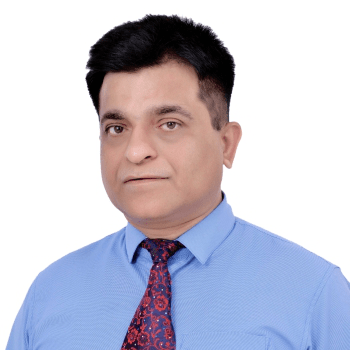
This week, eContent Pro sat down with Dr. Susheel Chhabra, a college professor, editor-in-chief, and author, and asked his expert advice for writing a manuscript and his opinion on the importance of peer review when publishing scholarly work.
Dr. Susheel Chhabra has more than 24 years of administration, academic, executive training, placement, and research experience. He has to his credit 21 research publications including six international books and eight international research papers. His extensive publishing experience has led him to serve as Editor-in-Chief of two international journals and as a special issue guest editor and reviewer for several other international journals. He has organized sundry Executive Development Programs, including national conferences, and has established one PGDM institute. Dr. Chhabra holds a doctorate degree from Kurukshetra University, a master’s degree from I.K. Gujral Punjab Technical University, a master’s degree from Indira Gandhi National Open University, a bachelor’s degree from Kurukshetra University, as well as a post-graduate diploma in Planning and Management of Small Scale Industries from Kurukshetra University in India. In addition, he has a certificate in Rural Development from the Indira Gandhi National Open University and is an IPMA Level-C Certified Project Manager.
Q: As the Editor-in-Chief of the International Journal of Political Activism and Engagement (IJPAE) what would you say are the most important things and/or concepts to remember when authoring a scholarly manuscript?
A: The author's scholarly manuscript is expected to make practical or managerial significance on the subject, create value in the academic and or research community, and make contributions to the literature. The manuscript should be popular, relevant, and help to achieve the mission of the journal. The quality of research design and adequacy of data analysis are the most important concerns that help to achieve practical or managerial significance on the subject.
Q: In your expert opinion, what are the most common mistakes authors make when compiling their work and seeking publication?
A: The common mistakes made by authors that lead to minor/major revisions/rejections include the following:
- The abstract is not able to convey the purpose, how it has achieved the objectives, and outcome of the manuscript.
- The research design is missing and, if present, does not have essential components.
- Literature review has been found to be outdated and not adequate.
- The analysis of the literature review and interpretation of data analysis is not adequate.
- Absence of clarity of the content or legitimacy of conclusions
- The manuscript does not achieve the overall objective it seeks to achieve as specified in the research design
- Grammatical errors and not following APA style while formatting the manuscript
Q: Do you think that some (or most) of the manuscripts submitted to your journal could have benefitted from preliminary rounds of peer review or editing prior to submission?
A: The peer review or editing prior to submission helps to improve the overall quality of the manuscript and reduce/remove deficiencies and common mistakes made by authors as mentioned in the previous two questions.
Q: How would you advise authors to handle edit recommendations and constructive criticism of their work from reviewers or editors?
A: The acceptance of manuscripts is highly dependent on how effectively the author has complied to the recommendations that have been made by the reviewers or editors. The criticism made on various parameters, including content, help to achieve managerial significance and achieve the overall objectives of the manuscript. I suggest the authors accept constructive criticism and comply to recommendations and remove deficiencies.
Q: Do you have any other comments or suggestions for our audience?
A: I would like to suggest authors have a preliminary review of the manuscript from the experts, make necessary changes as suggested, and then send the manuscript for publication. This will make the manuscript more qualitative, reduce publication time, and enhance chances of acceptance.
Many thanks to Dr. Chhabra for his cooperation and insights.
eContent Pro delivers the highest quality editorial services and content advisement to ensure polished, presentable, and readable written materials for organizations and independent clients worldwide. To learn more about how eContent Pro’s Scientific and Scholarly Editing team can benefit you through a complete assessment of your manuscript with a generous amount of feedback and critique from an expert in the field, please visit www.econtentpro.com and upload your document today.